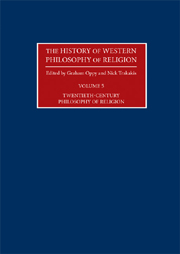Book contents
- Frontmatter
- Contents
- Editorial Introduction
- Contributors
- 1 Twentieth-Century Philosophy of Religion: An Introduction
- 2 William James
- 3 Henri Bergson
- 4 John Dewey
- 5 Alfred North Whitehead and Charles Hartshorne
- 6 Bertrand Russell
- 7 Max Scheler
- 8 Martin Buber
- 9 Jacques Maritain
- 10 Karl Jaspers
- 11 Paul Tillich
- 12 Karl Barth
- 13 Ludwig Wittgenstein
- 14 Martin Heidegger
- 15 Emmanuel Levinas
- 16 Simone Weil
- 17 A. J. Ayer
- 18 William P. Alston
- 19 John Hick
- 20 Mary Daly
- 21 Jacques Derrida
- 22 Alvin Plantinga
- 23 Richard Swinburne
- 24 Late-Twentieth-Century Atheism
- Chronology
- Bibliography
- Index
20 - Mary Daly
- Frontmatter
- Contents
- Editorial Introduction
- Contributors
- 1 Twentieth-Century Philosophy of Religion: An Introduction
- 2 William James
- 3 Henri Bergson
- 4 John Dewey
- 5 Alfred North Whitehead and Charles Hartshorne
- 6 Bertrand Russell
- 7 Max Scheler
- 8 Martin Buber
- 9 Jacques Maritain
- 10 Karl Jaspers
- 11 Paul Tillich
- 12 Karl Barth
- 13 Ludwig Wittgenstein
- 14 Martin Heidegger
- 15 Emmanuel Levinas
- 16 Simone Weil
- 17 A. J. Ayer
- 18 William P. Alston
- 19 John Hick
- 20 Mary Daly
- 21 Jacques Derrida
- 22 Alvin Plantinga
- 23 Richard Swinburne
- 24 Late-Twentieth-Century Atheism
- Chronology
- Bibliography
- Index
Summary
‘If God is male, then the male is god’. With this maxim, launched in the 1970s, American theologian and philosopher Mary Daly (b. 1928) opened an unsettling debate in the old disciplines of theology and philosophy of religion. Her book Beyond God the Father (1973), written on the back of the second wave of feminism in the Western world, immediately caused a great stir. It marked the start of feminist theology as an influential political and intellectual movement in churches and universities. In her writings Daly sagaciously exposed the patriarchal character and interest of Christian theological reflection and soon her name became a byword for feminist criticism of religion. The intellectual travels into ‘metapatriachal’ space and time that Daly subsequently undertook, reported in thick books full of sharp observations and hilarious wordplay, confirmed her radical feminist reputation, as did the controversies she evoked by keeping male students out of her classes in university for more than thirty years. Less well known is that her feminist stance also brought her to an original rethinking of the concepts of the subject, language and God in relation to each other, focused on the idea of ‘contagious transcendence’.
PURSUING THE HIGHEST AMBITIONS
Mary Daly was born on 16 October 1928 in Schenectady, New York, as the only child of a middle-aged Irish couple. She grew up in an enclosed lower-class Roman Catholic milieu.
- Type
- Chapter
- Information
- The History of Western Philosophy of Religion , pp. 245 - 258Publisher: Acumen PublishingPrint publication year: 2009

